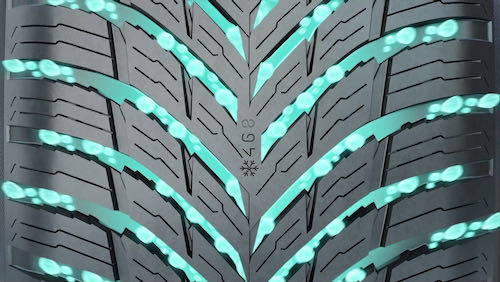This should be a quite simple question to answer, as it mainly depends on where you live and what weather conditions are present there. Like all other vehicles, SUVs require winter tyres when used in winter conditions. Winter conditions aren’t just when you have snow and ice on the ground, but it already starts when the temperatures drop below zero degrees Celsius. At this stage, the summer tyres will become hard and will not be able to conform to the surface that you drive on. This way that the rubber can remain soft and will be pressed into the cavities of the surface is what creates a lot of friction, i.e., grip; when you lose this because the tyres are hard, you will have much less safety. In addition, the summer tyres do not have the correct tread design to create sufficient friction, which is why you have drastically reduced grip and traction with summer tyres in winter conditions.
This is why you should avoid driving with summer tyres when you have winter conditions. When you then face ice and snow, you have very little chance to avoid accidents with tyres that are very hard and have no winter tyre properties. If you are driving in snowy conditions, you can choose to go change tyres between the seasons. This is done by having a set of summer tyres and a set of winter tyres that you alternate between these as the season changes. This gives you the best safety and performance throughout the year, at least if you do the changes in a timely matter.
There is also a possibility to choose all-season tyres that are winter approved, that you can use all year round. The winter tyres are better on snow and ice, but the all-season tyres fair pretty well in these conditions. You should avoid using summer tyres for the whole year if you faced some winter conditions during the year. These tyres are perfect for areas that have very unpredictable weather conditions, where you won’t have a long, harsh winter, but rather some occasional winter weather coming during the season. It gives you good safety as the all-season tyres are safe to drive with even in winter conditions on both snow and ice. They are also designed to prevent slusplaning when you have wet conditions during the winter.
The choice comes down to how many and severe winter conditions you, on average, tend to have where you live. If the winters are extreme, then go for the winter tyres; if they are quite mild and you want to be able to drive regardless of the weather forecast, then go for all-season tyres for your car or SUV all-season tyres for your SUV. You can avoid having to change tyres and predict when to do the change so that you don’t end up with summer tyres when the winter weather comes back for another few days during springtime.
For more information regarding all-season tyres, visit: https://www.nokiantyres.com/
